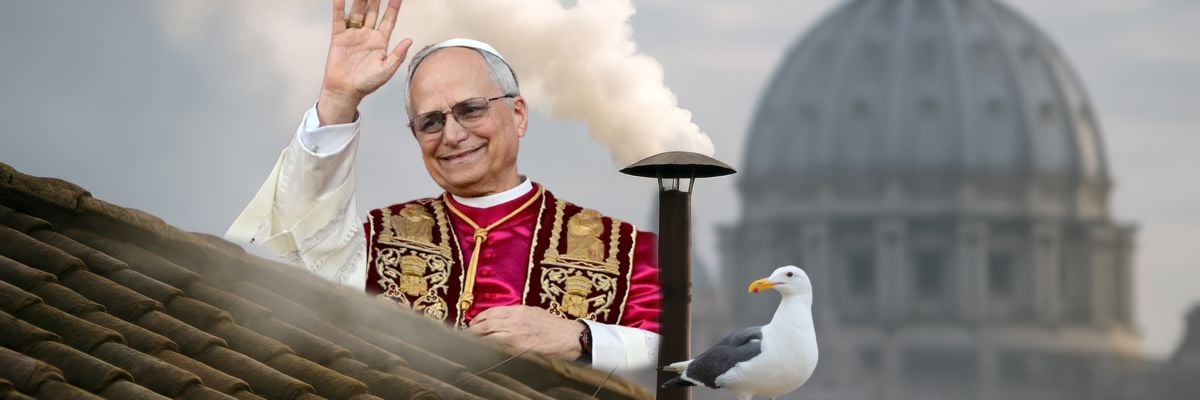
The election of Pope Leo XIV brings to a close a period of furious speculation that began in earnest with Pope Francis’s hospitalization last fall, accelerated upon his death, and reached giddy levels in the leadup to the conclave. Billions of pixels were spilled in online jawing and wagging over the mood of the cardinal-electors and their presumed dealmaking and alliance-building in the days before they were locked in the Sistine Chapel.
Now we have a pope, and like a flock of birds, the journalists and social media keyboard-jockeys have veered in unison to the equally furious effort to find clues, in the cardinal formerly known as Robert Prevost, as to what sort of a pope Leo XIV will be.
Leo’s predecessor, however, reminded us that a pope’s positions can be unpredictable and his ways inscrutable, and therefore how much of a fool’s errand is this business of pigeonholing him on day two. So we’re not going to try.
I did want to briefly reflect, though, on the conclave and its immediate result. And since papal elections begin to resemble major sporting events a little more each time—with global online odds-making and betting, and ubiquitous memes breaking down the field into brackets, March-Madness style—I thought I would reach for that mainstay of sports-journalism analysis and offer some Winners and Losers.
Winner: His Holiness Pope Leo XIV
As with the team that hoists the trophy or the prospect who goes number one at the draft, you can’t omit the cardinal who comes out of the conclave wearing white. Uniting the factions in the College and emerging from a brief and seemingly placid voting period backed up by statements of praise and confidence from the likes of both James Martin, S.J. and Cardinal Raymond Burke is no small feat. Viva il Papa!
Winner and Loser: That seagull on the roof
You had your moment of fame, little guy! But, sic transit gloria birdie.
Loser: Catholics (and others) who wanted a radical pope
A lot of the pre-conclave chatter focused on the divergent and extreme aims of two groups. On the one side were progressive Catholics and non-Catholic fellow travelers who wanted the next pope to take what they imagined was the progressive program of Pope Francis and put it on steroids. On the other were those who desired nothing less than a point-by-point repudiation of Francis’s writings, statements, and regulations, and a full-throated return to traditional formulas.
Without straying on the fool’s errand I mentioned above, it sure seems so far as though neither side got what it wanted. Pope Leo was created a cardinal by Pope Francis. He speaks positively of synodality, of accompaniment, of peaceable witness to the world, and of other things that evoke the perspective of his predecessor. Yet he appeared on the loggia of St. Peter’s wearing the traditional red mozzetta that Francis had pointedly omitted, along with an ornate stole. It is whispered that he has often celebrated the traditional Latin Mass in private. Nothing in the record of this theologically serious and substantive new pope says that he is fixing to sow doctrinal/moral revolution or even soft doubts. And there had been quite a few papabili—even reported frontrunners—about whom you couldn’t say that so confidently.
Winner: American Catholics
It took more than a few blinks to process the shock of hearing the name of an American announced by Cardinal Dominique Martini on Thursday. For everyone’s lifetime, it has been a truism that there could not be an American pope. A vicar of Christ from a world superpower would create resentment and an imbalance of interests. An American pope in the age of divisive Donald Trump would be even more outrageous. Besides, we just had a holy father from South America. Surely it was time to return to an Italian, or somebody within train distance of Italy. Or make history at the peripheries again by tapping an Asian or African cardinal.
Yet here we are. Although Pope Leo has the qualities and experiences of a global citizen, speaking multiple language and having spent many years in mission territory and in Rome, he was born and raised in suburban Chicago and is American without any asterisk. What does this mean for the United States and for American Catholics?
Surely it doesn’t mean that American political or ecclesial interests are going to get specially favorable treatment. (Certainly not the immigration policy of the current administration!) But an American bishop of Rome is a win for Americans because the birth nation of a pope enjoys a special affinity for and connection with the holy father. He’s one of their own.
And I think it goes deeper than simple national identification. Now Americans have a pope who is a White Sox fan; a pope who has spoken at high school graduations in our neighborhoods; a pope who speaks English with a flat Midwestern accent that, to tens of millions, sounds like home. He has probably eaten fried chicken at a parish potluck. He gets us. It’s a small thing that could be a big deal—especially in light of the still-strong faith of American evangelicals, from whose ranks many great converts have come and who might now be prompted to look to Rome with new interest.
Loser: The “St. Malachy Prophecy”
This infamous alleged medieval “Prophecy of the Popes” purports to describe, through brief epithets, every pope until the end of the age. We were down to the wire with Pope Francis, whose reign aligned with the last of the epithets and by a plain reading should have corresponded with the “final persecution” of the Church and ended with the destruction of Rome and the Last Judgment.
Well, Rome is still there, the world remains unjudged, and we are now plus-one on popes. So either this “prophecy” is definitively falsified, or its defenders have to devise a technical workaround of the sort that the Jehovah’s Witnesses claimed when Jesus repeatedly failed to return on schedule in the early twentieth century.
Winner: Catholics who want clarity and reform
This is still quite speculative, of course. But the new pope’s CV suggests an intellectual and legal rigor (he is a Dominican-educated doctor of canon law) that is incompatible with fuzzy thinking or imprecise expression. It also provides cause for hope that Leo may have the stuff to succeed in advancing needed financial and legal reforms at the Vatican.
Loser: Anybody who would have enjoyed a prolonged conclave
For many people, the election of a new pope is a bit like a holiday or hall pass. The longer it lasts, the more fun it can be. This one was short, and now it’s over.
Journalists and influencers who had been happily sampling Roman trattorias on expense accounts: time to go home. Secular media mischief-makers for whom more black smoke meant more clicks on headlines like “Still No Pope as Deadlock Among Feuding Cardinals Deepens”: time to find some other way to push your agenda.
And lay conclave-watchers the world over: time for us to come down from highs of chimney-gazing and prediction-swapping, and go back to the regular work of daily conversion to Christ, under the leadership of his new vicar.
Winner: The office of the papacy
It keeps going, and it’s still relevant to the world.
Loser: Satan
See above. The devil hates that.



